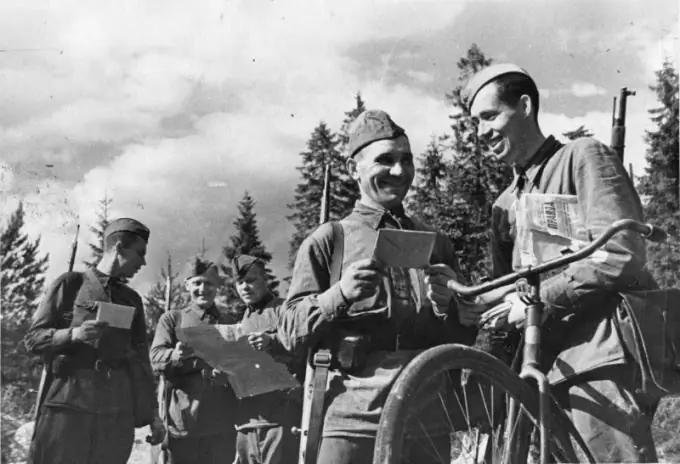- Author Antonio Harrison harrison@cultureoeuvre.com.
- Public 2023-12-16 07:44.
- Last modified 2025-01-22 21:44.
The Great Patriotic War became a defining event in Russian history of the 20th century. For 4 years within the framework of this large-scale conflict, many military battles took place, and the most important of them must be known to understand the course of the war.

Defense of Moscow
From the first day of the war, from June 22, 1941, the main goal of the German troops was the capture of Moscow. Active hostilities in this direction began on September 30, 1941. Initially, the German leadership planned to end the war with this date, but the resistance of the Soviet troops significantly slowed down the advance of their armies.
The first stage of the offensive was the German Operation Typhoon. As a result of this offensive, Bryansk and Kirov were captured, and in the area of the Vyazma River, more than 700 thousand Soviet soldiers were surrounded. More than 600 thousand of them were taken prisoner. In the second half of October, Mozhaisk was captured, and the German armies approached 100 km to Moscow.
The offensive on Moscow was stopped only at the beginning of December, after the most combat-ready units of the Soviet army, including the newly arrived divisions from Siberia, were assembled for the defense of the capital. The Soviet army's counteroffensive began with the Kalinin operation. As a result of a series of subsequent offensives, Soviet troops liberated Klin, Yelets and Tula. The Rzhev-Vyazemskaya operation of 1942 made it possible to finally push back the German troops from Moscow.
A number of experts are of the opinion that severe and early frosts in that year played a role in the defeat of the German troops near Moscow, but this factor cannot be considered decisive.
Stalingrad battle
Having failed in the attack on Moscow, the German command reoriented its efforts to the south. By mid-July 1942, the Wehrmacht armies approached Stalingrad, the most important city on the Volga. The battles in the Stalingrad direction began on 17 July. By early August, the Germans crossed the Don and became a real threat to Stalingrad.
At the end of August, battles began on the territory of the city. Fighting in and around the city continued throughout the summer and autumn, and in November a Soviet counteroffensive began. As a result of Operation Ring, Soviet troops surrounded units of Field Marshal Paulus's tank army and took them prisoner. The city was defended, but at a high cost - Stalingrad was almost completely destroyed, and the losses of Soviet troops amounted to more than 400 thousand people killed and twice as many wounded.
The Battle of Stalingrad was also of great international importance - the allied countries realized that the final victory over Hitler was possible.
Battle of Kursk
The Battle of Stalingrad was a turning point in the war in favor of the Soviet army, and the Battle of Kursk consolidated this success. As a result of the offensive of Soviet military units in the area of this city, a ledge was formed on the front line, which could be called the Kursk Bulge. German troops planned to capture part of the Soviet army in a ring, but they did not succeed.
The climax of the confrontation was the Battle of Prokhorovka, one of the largest tank battles in world history. The result of the operation was the liberation of a significant part of Ukraine by Soviet troops and the final turning point in the war in favor of the USSR.






